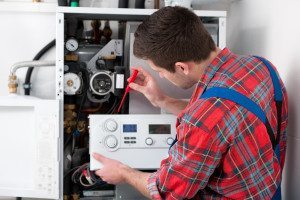Are gas water heaters better than their electric counterparts?
The U.S. Department of Energy says that heating water is the second largest expense in your  home, behind heating and cooling your house. You spend, on average, about 12 to 18 percent of your power bill on this effort.
home, behind heating and cooling your house. You spend, on average, about 12 to 18 percent of your power bill on this effort.
For some families, saving money and reducing energy consumption is a top priority. For others, it’s all about having plenty of hot water to fill the bathtub, wash dishes and clothes or take that eye-opening morning shower. Which camp you’re in helps you determine which water heater may be better for you.
The Pros and Cons of Electric Water Heaters
About 40 percent of U.S. water heaters are electric. Typically they cost less to install because it’s not necessary to run or connect a gas line. They cost a bit more to buy and operate, and they heat water more slowly than their gas counterparts (more on that below).
You can add extra insulation or an insulating blanket around your tank to improve operating efficiency and reduce power use.
If electricity is your water heating method of choice, check out the new high-efficiency heat pump (HPWH) models. They cost more initially, but over time, you may be surprised at the potential cost savings.
Is a Gas Water Heater the Better Choice?
In general, the answer to this question is yes. Unfortunately, not all homes are equipped with natural gas.
Given the choice, however, gas models are typically more efficient and less costly to operate. This is true for two main reasons: First, gas is cheaper than electricity. But the real difference comes in the way each type works to heat the water.
Gas models use heat from burning fuel (gas) to heat the water, whereas electric models use electric resistance coils. Without giving a full physics lesson, let’s just say that the gas method does the job more quickly. In fact, you rarely run out of hot water with a gas model, because it can recover much more quickly.
Gas water heaters are also much less expensive to purchase, initially.
You can determine which type is better for your home and family by using the Energy.gov cost calculator for electric and gas water heaters.
Tankless Gas Water Heaters
Tankless models, popular in Europe for decades, began to gain popularity in the United States in the 1990s. At that time, however, U.S. manufacturers hadn’t quite worked out all the bugs.
Today, these heaters are both reliable and highly efficient.
By heating on demand, tankless models provide a never-ending supply of hot water without wasting the energy to maintain a tankful at all times. With a life expectancy of about 20 years, these models will last much longer than traditional designs, and you never need fear a devastating flood and the resulting damage to your home.
The EPA’s Energy Star site estimates that a tankless model will save about $1,800 over its lifetime, when compared to a standard gas model. And since gas models save about $120 per year when compared to those that use electricity, add another $2,400 in savings if you upgrade to a 20-year tankless gas unit from a standard electric water heater.
Complete Appliance Repair, serving North Salt Lake and the neighboring communities, sells, installs and services all types of home appliances. Contact us today for an evaluation of your home and water heating needs. We can help you determine whether electric or gas water heaters are better for your family.

